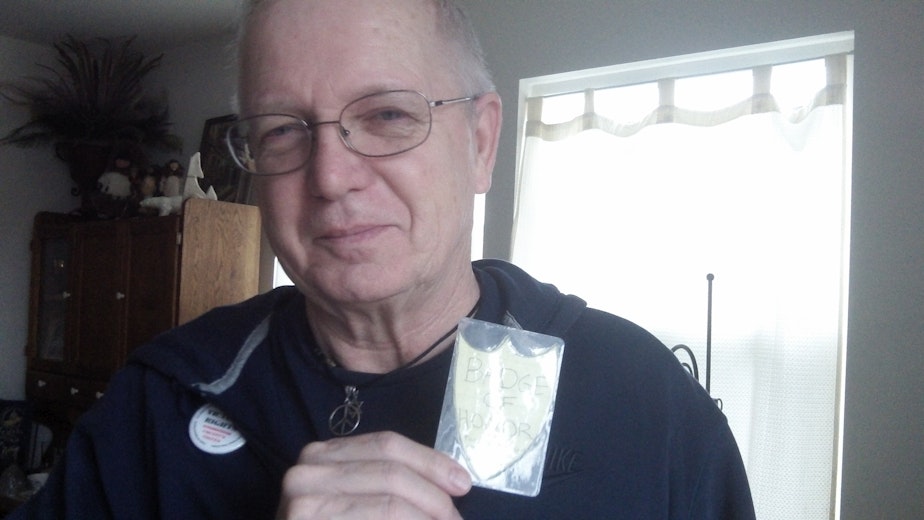Corrections Officers Say Prisons Still Unsafe Two Years After Biendl Death

Runners in a 5K race will wind through the grounds of the Monroe Correctional Complex on Sunday to remember Corrections Officer Jayme Biendl. Tuesday will mark the two years since Biendl was found strangled in the chapel at the prison.
Since the recession, budget cuts, layoffs and facility closures have changed the prison landscape in Washington state. And some say it’s created unsafe working conditions for staff.
There are approximately 16,000 inmates housed in 12 facilities throughout Washington. Most of those incarcerated have committed violent offenses. Washington State Prisons Director Bernie Warner says the compact nature of the state’s facilities is challenging for inmates and staff.
On any given day even the slightest change in routine can be dangerous. “Prisons run based on a culture,” Warner explains. “And so as you disrupt that it becomes more difficult to operate the institutions. We have seen periods in the last few years where there’s been an increase in violence.“
In November, the Department of Corrections' annual staff safety report to the Legislature detailed several incidents of violence. In February last year, inmates at the Washington State Penitentiary armed themselves with homemade weapons and turned on staff, prompting a lockdown. In August, a corrections officer at Monroe received serious injuries after being attacked by a mentally ill inmate.
Even still, Warner says overall violence is down slightly.
Michael Boe understands unpredictable danger comes with the territory of being a corrections officer. “Most of the people that we deal with are sociopaths.“
Boe is a sergeant at Monroe Correctional Complex. He and other members of the Teamsters Union think the DOC isn’t doing enough to keep staff safe. One of the biggest problems he says is that officers are still solo at some posts. Just like Jayme Biendl was on the night she was killed.
This situation can be especially dangerous at night. Boe explains, “On midnights, there are 125 inmates to one officer. There are people that will tell you that the only reason we’re in control that we get the keys is that the inmates allow it. There’s some truth to that.“
The DOC says it’s made sweeping changes since the death of Jayme Biendl, and that staff safety is a top priority. The agency has taken action on all 15 of the recommendations made by the National Institute of Corrections. The government agency was called in to evaluate safety after Biendl’s murder.
Since the review, DOC has offered staff more training, issued pepper spray to all custody personnel, and created security advisory committees at all 12 prisons.
While Boe concedes that the department has made some changes, he and the union that represents more than 3,600 corrections workers in the state say it’s not enough.
Teamsters Local 117 held a rally in Olympia this month. They demand that the Legislature increase staffing at the state’s prisons. They also want the right to call an arbitrator to mediate labor disputes because they can’t strike. It’s an option they say is afforded to other public safety workers in the state.
DOC's Bernie Warner says it’s unnecessary. “My belief is that we have structures in place where we have opportunities for discussion and coming up with solutions for those issues."
For the DOC, arbitration could get expensive. If an issue between the agency and the union went to arbitration and the union won, it would force the DOC to ask legislators for additional funds outside of the regular budget.
Both the union and the DOC agree that there is a need for increased staff at the state’s prisons. During the last two budget cycles requests to the Legislature for additional funds have been rejected.
Sergeant Michael Boe says that’s exactly why it’s so important to have arbitration as an option. “Until we get that it’s going to be an uphill battle for everything,” he says.
For Boe, staff safety is more personal than most. He administered CPR to Jayme Biendl the night she was murdered. But it was too late. “Jayme was a friend of mine. I felt that if I had got there when they found the guy who allegedly murdered her, I could have saved her. That’ll haunt me.”
By the time she was found, Biendl had been dead for more than an hour. Staff was dealing with what they thought was a bungled escape attempt by inmate Byron Sherf.
Sherf, who was incarcerated for kidnapping and rape, is on trial for Biendl’s murder. He could get the death penalty if convicted.
Boe says everybody in corrections work has a reason for doing the job. For most, it’s to protect their families. Boe carries a picture of his 11-year-old daughter, Mattie, in his infraction book. Underneath it photo is a little yellow laminated card. His daughter made him a badge of honor for trying to save the life of Jayme Biendl. Boe says he carries it with him all the time.
Boe says it’s important to keep Biendl‘s memory alive because in prison, complacency is dangerous. It's dangerous because it will happen again. "Just not on my watch," Boe proclaims.

